
Loading...

Loading...
July 13, 2022 12:12 pm Back to Home
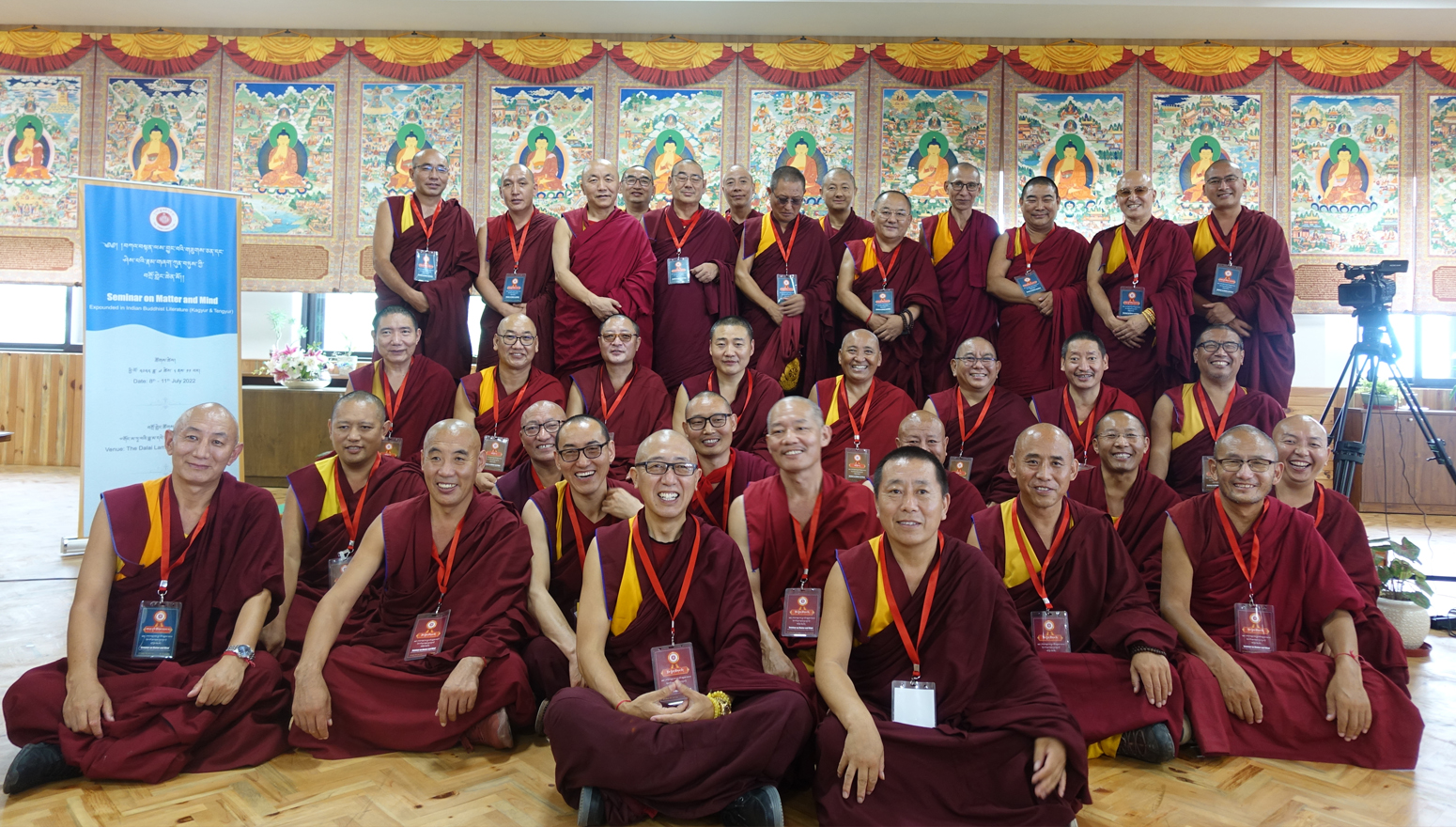
The Dalai Lama trust is pleased to report that the Seminar on Matter and Mind, as expounded in Indian Buddhist Literature, held over four days in the conference hall of the newly inaugurated Dalai Lama Library and Archives came to a successful conclusion on the 11th of July 2022. Mind and Matter, expounded in Indian Buddhist Literature (Kagyur and Tengyur) is a project focussing on the compilation of materials pertaining specifically to the understanding of Matter and Mind as found in ancient Indian Buddhist texts, particularly the Kagyur and Tengyur texts. This project is funded by the Dalai Lama Trust and came about as a response to an issue raised by His Holiness several times.
His Holiness the Dalai Lama speaks frequently about the importance of understanding the workings of our minds in order to overcome our afflictions while cultivating positive qualities. His Holiness has had discussions with various scientists and psychologists over many decades on this subject and has often observed that western psychology and its understanding of the mind is at a nascent stage when compared to the much more sophisticated system in ancient Indian Buddhist texts. His Holiness has suggested that the insights contained within these texts are extremely precious and that this information should be widely available to all those interested in understanding both matter and the mind. The Kagyur and Tengyur texts contain a very advanced understanding of matter or material phenomena, its many classifications and modes of existence. Similarly, the mind is explained in great depth and detail, from how the mind functions to its many states and helpful methods to tame afflictive states and gain clarity and focus.
To this end, the Compilation on Matter and Mind project was started in June of 2017 with His Holiness’ blessing. Eight Geshes were selected from various parts of South India to comprise the core team of this project. The texts being used for this project are the Kagyur and Tengyur texts as well as other resource materials. The purpose is to put together the information pertaining either to matter or to the mind found in these texts into a comprehensive and clear format so that all those interested in these topics may have a structured resource to study. Over the years, several drafts have been made to compile the relevant materials pertaining to Matter and Mind as expounded in ancient Indian buddhist texts. These many drafts have been checked by several Geshes and scholars, who have contributed greatly to the project by pointing out any contradictions and suggesting which points may be relevant and which might not.
A seminar was held between the 8th and the 11th of July 2022, to debate the final draft of the research work and compilation of Matter and Mind. Aside from the core team, 14 Geshes and 50 observers were invited to participate in the debate and Seminar. This was a chance to review this body of work in the presence of several buddhist scholars and luminaries. The buddhist practice of debate is a very advanced system based on logic and reason, meant to facilitate the correct understanding of buddhist texts. Therefore, to debate various points from this compiled text is a traditional and thorough approach in analyzing and establishing the validity of the text.
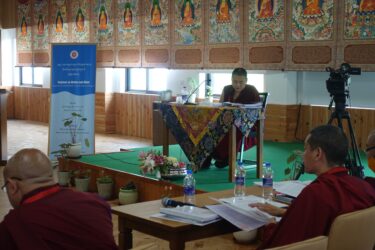
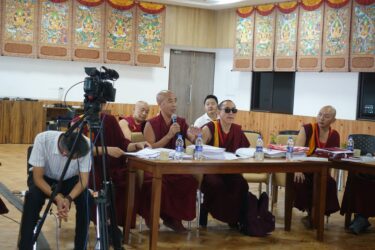
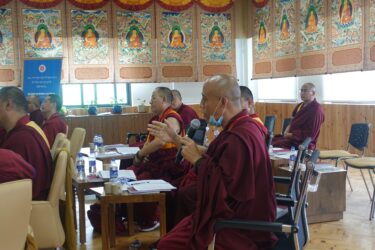
The seminar began on the afternoon of the 8th of July with opening remarks by Ven. Yangten Rinpoche, who is in charge of this project and is the secretary of the Office of His Holiness the Dalai Lama. Ven. Yangten Rinpoche explained how this project came to be and provided a summary of the last 5 years of this project including the aims and objectives of the project. Next, Ven Samdhong Rinpoche, the special guest of the event addressed the gathering. Prof. Ven. Samdhong Rinpoche talked about the importance of this project, referencing the various times His Holiness has touched on this subject. Rinpoche emphasized that the term ‘psychology’ as it is understood today simply is not adequate to describe the vastness of the workings of the mind or the science of the mind. He suggested that perhaps it would be helpful to find a more appropriate term. Rinpoche also explained that many western psychologists and scientists are showing great interest in the buddhist understanding of matter and mind, explaining that with the rising interest in these subjects, this project is very much needed. This was followed by an introductory speech by Geshe Jigme Tenphel, an editorial member, who spoke about the careful process of compiling and editing this body of work. Geshe Lobsang Dakpa, a member of the editorial committee then introduced the compilation on ‘Matter’ followed by Geshe Rinchen Namgyal who introduced the compilation on ‘Mind.’ Following a short tea break, a lively and interactive debate was held by Geshe Yeshi Lhundup of Losel Ling Monastery followed by a question and answer session. Geshe Lobsang Choephel of Gaden Shartse Monastery held the next debate, which was also followed by another question and answer session. This concluded the first day of the Seminar.
The second day of the seminar began in the afternoon and was dedicated to debates on the compilation on matter. Each debate was followed up by a question and answer session directed to the Geshes presenting their debates. The opening debate was held by Geshe Dawa Sangpo from Gaden Jangtse Monastery, followed by a debate held by Geshe Lobsang Khechok from Gomang Monastery. The last debate of the day was held by Geshe Thabke, bringing the second day to a close.
The third day of the seminar began after lunch and was dedicated to debating the compilation on mind with five debates lasting about 20 minutes each, all followed by 10 minute long question and answer sessions. The first debate was brought by Geshe Tenpa Phakchok from Gomang Monastery, followed by Geshe Gyaltsen Wangdue of Gaden Shartse Monastery. After a brief tea break, the next debate was brought by Shisa Trungchen Rinpoche of Gaden Jangtse Monastery. Following this, Geshe Lobsang Khechok held a debate and finally the last debate was brought by Geshe Ngawang Kalsang of Losel Ling Monastery. This concluded the third day of the Seminar.
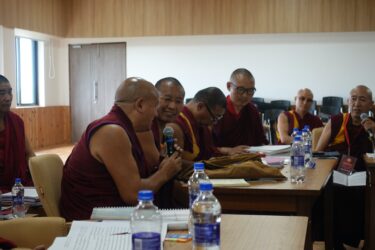
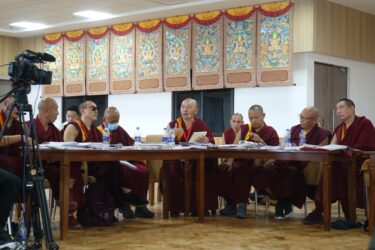
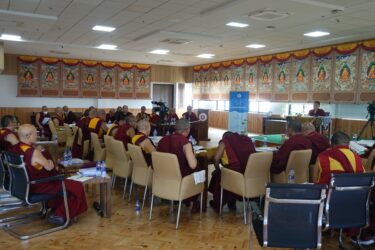
The fourth and final day of the seminar began at 9 am and consisted of 6 debates, each followed by a brief question and answer session. Geshe Tenzin Palchok brought the first debate. A short tea break was taken, following which the next debate was held by Geshe Ludru Tender from Gaden Shartse Monastery. Geshe Thupten Tsultrium of Sera Mey Monastery presented the third debate for the day, followed by Geshe So Am Wangchuk of Sera Jey Monastery. This concluded the morning session of the seminar as the participants took a lunch break.
The afternoon session of the seminar started off with a debate by Geshe Yangten Rinpoche which was followed by a brief question and answer session. After a break for tea and refreshments, Geshe Ngawang Thokmey of Sera Jey Monastery presented the final debate and held a question and answer session. Next, the floor was opened to all the participants to give any suggestions they had noted through the duration of the seminar. Ven. Yangten Rinpoche, secretary of the Office of His Holiness the Dalai Lama and incharge of the whole project concluded the seminar by summarising the important points raised and noted throughout the seminar and requested all the invited Geshes and observers to continue their support by giving their valuable suggestions. Geshe Rinchen Namgyal, a member of the editorial committee gave the final words of thanks to all the brilliant Geshes and scholars in attendance who took time out of their busy schedules to contribute to the final draft of this project. He further thanked the Dalai Lama Trust, Audio and Visual Section, Account Section, Staff of DLLA, Sungbhum Section, and other concerned individuals for their assistance and contribution in making this seminar a success, which brought the seminar to a close.
The final compilation will result in one volume on matter and three volumes on mind as expounded in the ancient Indian Buddhist texts of Kagyur and Tengyur. The project is now in its final stages, as the team will begin incorporating the various notes and suggestions provided on the final drafts of the four above-mentioned volumes. The Dalai Lama Trust is very pleased that this Seminar proved to be a fruitful meeting and meaningful exchange of ideas by experts in the field and we look forward to the wonderful conclusion of this very important project. We pray that His Holiness will continue to bless this project so that this precious resource may bring immense benefit to all those who will study it.
Photo courtesy OHHDL.
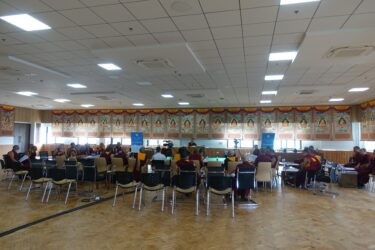
The Sonamling Tibetan Settlement in Leh, Ladakh was established in 1960 and comprises of about 7,000 people and a magical view of the horizon that is laced with the magnificent snow-capped Himalayas. There are ...